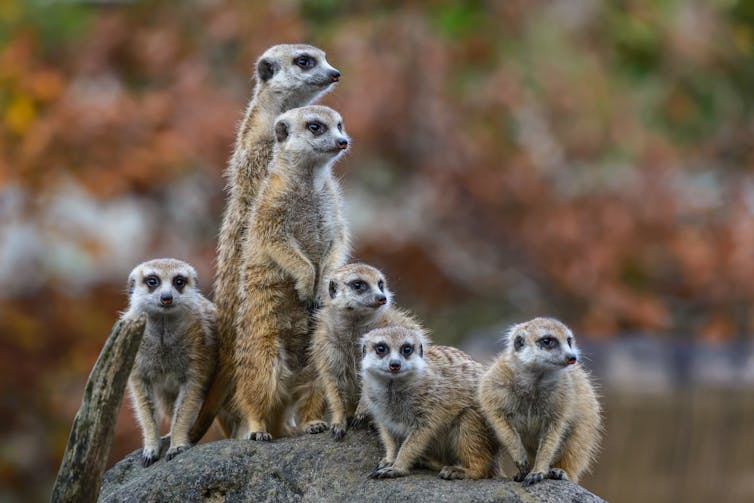What Do Human Brains Have That Animals Don't
If humans and other animals were living in the aforementioned environs, why didn't other animals evolve similar us? – Sami, aged 13, London, Britain
This is a bright question. Humans have evolved differently to other animals. We have much bigger brains relative to body size and in accented size than other mammals, and accept a level of intelligence that other animals don't.
In that location are many advantages to intelligence, such as the ability to plan and cooperate, innovate new techniques and share information about what works.
The reason that living things evolve certain features, like stripes on a tiger, bright colours on a butterfly or a big brain in humans, is that these features have benefits that assist them survive. The living things with these benign features and so pass them on to their offspring.

Curious Kids is a serial past The Conversation that gives children the chance to take their questions about the globe answered by experts. If yous take a question you'd like an expert to answer, send it to curiouskids@theconversation.com and make sure yous include the asker's first name, age and town or city. We won't be able to answer every question, simply nosotros'll practice our very best.
There are a number of hypotheses – ideas – about the origins of human intelligence. The one I do my enquiry piece of work on is called biocultural reproduction.
Having large brains allows humans to keep more than babies alive than other animals. Co-ordinate to the biocultural reproduction hypothesis, how intelligence helps us to keep babies alive comes downwards to how we care for each other – and peculiarly how we wait after children.
Helping each other
Many animals alive in small or large social groups, and some social species of birds and mammals, such as meerkats, help each other to feed and protect their babies. This is called cooperative convenance. The helper animals don't accept whatsoever babies of their ain. They give upwardly their own reproduction to aid a ascendant family unit fellow member, such as their mother or older sister.

People are different. Anyone who wants to and is able to take a baby can do so. Non all human parents can or will intendance for their own babies, but other people often accept care of the children of others.
Parents and other carers may invest in young people for many years, sometimes for all their life. I am a parent and I proceed to assistance my grown-upwards offspring, and their offspring – my grandchildren. This helping is what scientists phone call biocultural reproduction.
The carers may exist genetically related to the child they look subsequently, just they also may not be. The rules for how people intendance for each other are not set by genes, but by the names we requite each other. These are non names like Sami or Barry, but things like "girl", "auntie", "grandfather", "cousin" or "friend".

Using names like these requires symbolic language. This means that the names we call each other represent ideas about how we should treat each other. Only humans and some of our ancestors evolved this kind of symbolic communication.
We might call our friends "sis", "brother" or "cousin". In many human being societies, younger people refer to older people they are not genetically related to as "auntie" or "uncle". Some religious leaders are called "father", "female parent" or "sister". These names are used every bit a sign of respect and also give us information virtually our relationships with these people.
Big brains needed
This naming thing that people do is complicated. Big-brained intelligence is needed to call up all the names and the lifelong history of interactions that we have with family and friends.
Our closest biological cousins, such as chimpanzees, have brains only one-third the size of ours. They do not use symbolic language or telephone call each other by names. Female parent chimpanzees treat their own infants and no other chimps help, not even fathers or grandparents. Just one-third of chimpanzee babies survive to machismo.
In dissimilarity, the wide range of people who provide care – including feeding, care when ill, education, money and dear – means that human being babies are more likely to survive and thrive. Big-brained intelligence helps usa care for each other and helps to explicate, in function, why the man population is budgeted 8 billion people.
Source: https://theconversation.com/curious-kids-why-didnt-other-creatures-evolve-the-intelligence-humans-have-172673
Posted by: salazarexions.blogspot.com

0 Response to "What Do Human Brains Have That Animals Don't"
Post a Comment